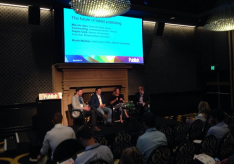Tablet publishing fails to create habit with readers due to less frequent publishing rate
Publications on a tablet struggle to create a reading or viewing habit with readers due to it often being a weekly or monthly cycle of new content, ABC’s director of innovation Angela Clark has said.
Speaking at the Publish conference in Sydney today, Clark suggested publishers utilising tablet apps for longer form content need to pair it with sites with a more frequent content cycle as a reminder to readers to check the content released less frequently.
“Even a weekly cycle it’s not a daily habit where you’re looking at news a few times a day,” Clark said on the ABC’s The Brief app.


